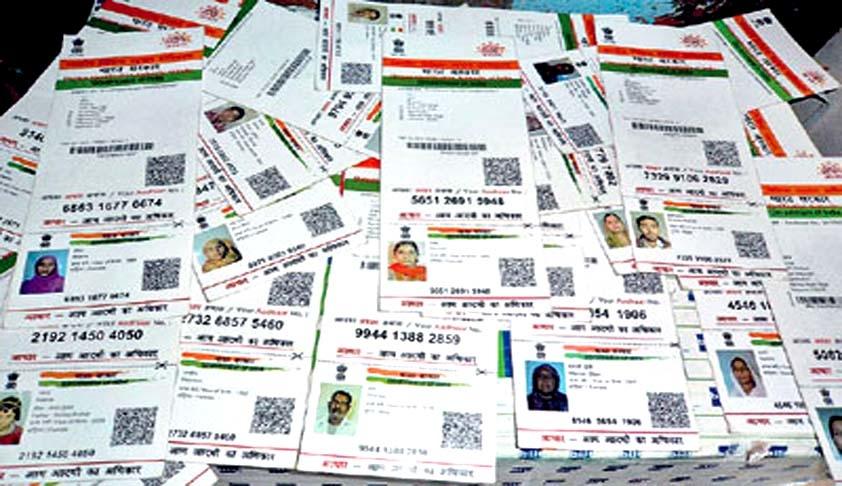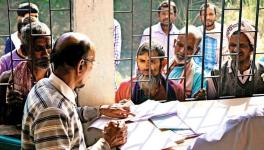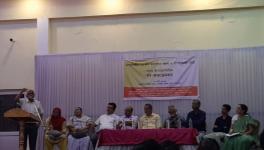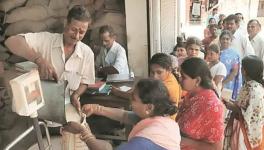‘Show Medical Records For Aadhaar Rejection Letter’ Says Government to Blind Leprosy Patient

At a leadership summit organised by a media house in the national capital on Thursday, November 30, Prime Minister said that he is ready to pay the price for the steps taken by him for a better India and asserted he would not be deterred. The only problem with this statement of the PM is that it isn’t him or his ministers who are at the receiving end of his hair brained schemes, but the poor and marginalised society of the country.
The most recent victim of this is 65-year-old Sajida Begum, who has not been receiving her monthly pension of a meagre Rs 1,000 for the last three months and all this because she does not have an Aadhaar card.
Sajida is a Leprosy patient and has been living in a Leprosy hospital on the Magadi road for the last 10 years after her family dumped her there. Leprosy causes severe, disfiguring skin sores and nerve damage in the arms, legs, and skin areas around the body. And in Sajida’s case, the disease took away her fingers and also her eyesight.
Now in order to get an Aadhaar card, Sajida would require a biometric verification. But without her fingers or her eyesight, she is unable to provide any details for the card. In August, Sajida had received a letter from the deputy tahsildar’s office in Rajajinagar that her pension would stop in seven days if she failed to link it to her Aadhaar card.
Dr Ayub Ali Zai, the administrative medical officer, Leprosy Hospital, had written a letter to UIDAI officials requesting them to exempt her from biometric verification considering her problem. But Sajida’s woes were far from ending. Out of the 57 patients in the hospital, 10 of them have similar conditions like Sajida. One of them, Rajanna, has also received the same letter from the tehsildar’s office.“We don’t know if this is just an administrative delay in sending pension or if they have stopped it,” Zai said in a report.
Incidentally, there is a process where one can get a letter of rejection for getting the Aadhaar. But according to a report, patients need to come themselves with their medical reports and proof of their disability.
“Let them get enrolled first. Even if the woman doesn’t have sight, there may be biometrics that the machine can read. Only when the machine is unable to read and they get a rejection letter, it can be considered at the back end. There are cases where leprosy patients have got Aadhaar with whatever is left of their biometrics,” said a top official requesting anonymity.
Last month, 55-year-old Sakina Ashfaq died of starvation in Bareily, as her family was denied ration at the village PDS centre. She was paralysed and had to be carried by her family members each month to the PDS centre to give her fingerprint for the biometric registration. According to her husband, Sakina was too sick to be moved around in November and since the officials did not get her fingerprint, no ration was given to the family for that month. After four days of going without food, Sakhina died.
The government officials refused to believe that she died because of starvation and blamed it on her already deteriorating health. “There is no doubt that the family is very poor but it is hard to believe that she died of starvation. She died early Tuesday morning and was buried the same evening. Post-mortem could not be conducted to establish the truth (cause of death),” said Bareilly District Magistrate R Vikram Singh in a report.
Before this, Santoshi Kumari, an 11 year old girl died after starving for 4 days in a similar case in Jaldega block in Simdega, Jharkhand on September 28, 2017. Her family was denied ration for failing to link their below poverty line ration card with AADHAAR. Here also the preliminary report said that Santoshi had died from malnutrition and malaria. But after closer inspection, it was found out that the family’s ration card was deleted after an order by the state’s chief secretary on April 5 that made Aadhaar linking mandatory for ration cards and invalidated the cards of the families who failed to do so. Interestingly, the state’s food minister, Saryu Roy, claimed to have no idea of the order until it claimed a life of a child months later. Similarly, three Dalit brothers died in a span of 15 days was reported from Karnataka. Their ration cards too were invalidated because of not being linked to Aadhaar.
The chaos, caused by the government’s extreme push for the scheme without any clear guidelines has proven to be fatal mostly for the marginalised sections of the society. And all this is taking place even though Aadhaar has not been made mandatory for most of the welfare schemes. The Supreme Court, which was going to hear a set of litigations, had decided to club all of them together and refer it to a 5-member constitution bench that was to be formed by the end of November 2017. It is already December and the apex court still seems to be dilly-dallying on an issue as sensitive as this. The question is for how long will the judiciary remain quiet and let the government carry on with the incessant push to Aadhaar? How many deaths of the starving poor and how many leprosy patients without a pension will it take for the Court to toughen up and take a strong stand against the overenthusiastic officials enforcing the rules that don’t really exist?
Get the latest reports & analysis with people's perspective on Protests, movements & deep analytical videos, discussions of the current affairs in your Telegram app. Subscribe to NewsClick's Telegram channel & get Real-Time updates on stories, as they get published on our website.
























